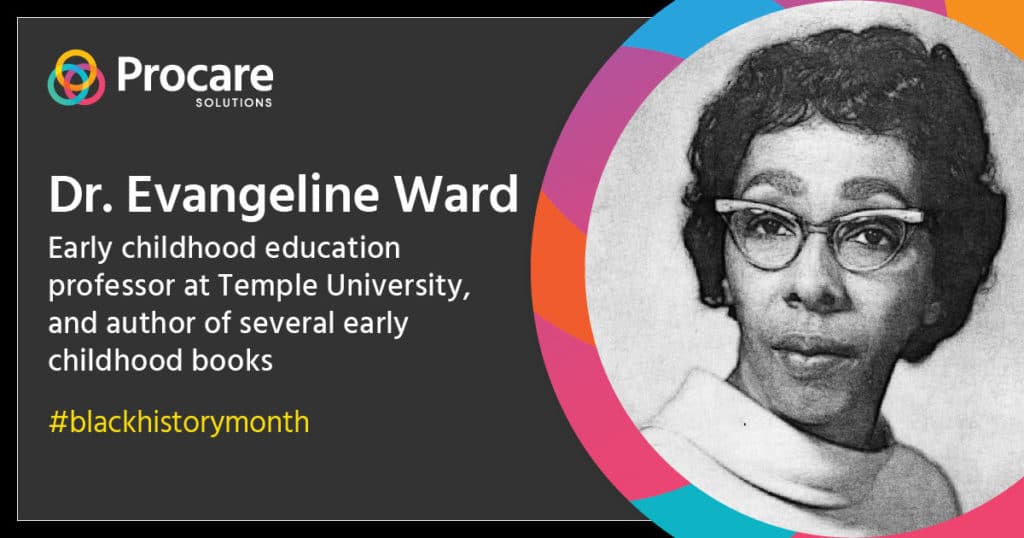
Dr. Evangeline Ward was born in 1920. Her list of achievements includes her work as an early education professor at Temple University, as well as being a prolific author. The code of ethics she created for early childhood professionals provided a foundation of professionalism for educators that continues to guide and motivate child care advocates today.
Much of her work focused on why it’s important to treat children as individuals, and how important it is for an educator to work with families throughout the development of the child.
This ideology, still practiced today, has allowed for a “grander shift from child care to family care in today’s modern world,” according to the Child Development Council.
“Parents are a child’s first and most continuous teachers … We who move in intermittently to foster the plan for growth have a responsibility with parents, to do so jointly,” Dr. Ward said in a speech several decades ago.
Before that speech, she helped found the Black Caucus of the National Association for the Education of Young Children (NAEYC) in 1969 at a NAEYC conference in Salt Lake City, Utah.
“Upon arrival, blacks and other people of color were openly discouraged from attending not only the conference, but also the opening session held at the Mormon Tabernacle,” according to a history of the caucus.
Dr. Ward helped organize a meeting to discuss the situation and how Black people could become more active and prominent within the organization, as well as influence decisions and make policy through the conference and NAEYC’s affiliate network.
As a result, the conference format was reorganized into committee meetings designed “to discuss the treatment of citizens of color in this country who were working in the early childhood education field.”
NAEYC also decided that it would never again hold its conference in a city where people of color experienced such blatant discrimination, the caucus history states. Dr. Ward went on to serve as NAEYC’s president.
That was just one example of how Dr. Ward fought hard in her life.
“Progress is the result of opposing forces, things pushing against each other. And in other words, it is called work,” she was quoted as saying in a Council for Professional Regulation paper titled “The African American Pioneers: Legacy Influences on Early Childhood Teacher Preparation.”
Dr. Ward was a member of that council’s Black Advisory Task Force.
In 1977, she took on the challenge of developing a code of ethics for early educators. She also was the first executive director of the Child Development Associate national credentialing program.
She joint-authored “Ethical Behavior in Early Childhood Education.” This code of ethics consists of principles related to three primary commitments, according to an online description: to each child as an individual, to each family as a unique constellation of people and to oneself and the profession. Codes of ethics for administrators and directors, as well as policy and decision makers, also are included.
Dr. Ward died of a cerebral hemorrhage in 1985 while visiting Australia, where she presented two papers and participated in workshops and seminars at the Australian Early Childhood Association Triennial Conference in Brisbane.
We celebrate her many achievements and are grateful for her work in early childhood education.
Continue Learning About Black History!

We hope that sharing the accomplishments of Dr. Ward and other incredible Black leaders in early education will inspire you to include Black history in your classrooms year-round. Please check out our blog posts on Dr. Edmund Gordon, who was critical in founding the Head Start program, and on Fannie C. Williams, who opened the first nursery school and Kindergarten for Black children in New Orleans in the 1930s.
Books are a great way to teach the kids in your care about Black history.
Here are five picture books recommended by the City’s First Readers group, an initiative of the New York City Council, to keep learning about Black history, after Black History Month ends:
1.“The ABCs of Black History” by Rio Cortez: Kids will appreciate the bright colors and rhyming verses. Educators and parents will love its references to moments, people and places that are important to Black history.
2. “We Shall Overcome” by Debbie Levy: This is a story about the song “We Shall Overcome,” which became an anthem for enslaved people and eventually also a theme song during the civil rights movement. Children learn the lyrics, along with the song’s history and what it represents: hope, strength and resilience.
3. “Little Leaders: Bold Women in Black History” by Vashti Harrison: In this book, we meet several Black women who dared to go after what they wanted and demand what they deserved, at times in history when it was dangerous to do so. While you’ll recognize some of the names of these women, such as Harriet Tubman and Rosa Parks. You’ll also meet other incredible Black women, like Alice Ball. She was a chemist who created the most effective treatment for leprosy during the early 20th century.
4. “The Youngest Marcher: The Story of Audrey Faye Hendricks” by Cynthia Levinson: You are never too young to make a difference — that much was clear to Audrey Faye Hendricks, the youngest known child to be arrested for a civil rights protest in Birmingham, Alabama, in 1963. Audrey knew segregation was wrong. This is the story of her bravery and her willingness to walk into the unknown to stand up for what she knew was right.
5. “Shirley Chisholm Is A Verb” by Veronica Chambers: This book delves into more recent Black history. Readers get to learn about Shirley Chisholm, who famously said, “If they don’t give you a seat at the table, bring a folding chair.” She was the first Black woman elected to Congress and the first Black woman to run for president of the United States. While this book is a story about Chisholm, it’s also a call to discover YOUR verb: how will you take action to make a change?



